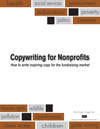You must know why people don’t give. What stops them dead in their tracks? What objections do they have to your charity?
Regardless of how wonderful you “know” your charity is . . . other people have good reasons for not sending you money. Some of these reasons – objections – are obvious and some are hidden.
You need to address both the obvious and the hidden objections in your appeals. If you don’t, you’re turning donors away. You receive FAR FEWER donations. Guaranteed.
Obvious Objections to Giving
Even though Mrs. Geneva Grand-Donor might be thinking, “I’d like to help these people. I like what this organization is doing.” Her mind automatically brings up reasons why she shouldn’t give. It’s human nature.
Yes, Mrs. Geneva Grand-Donor has objections. And most of these are rather obvious. Your website, emails, direct mail letters, etc. all need to address her objections in the copy and other creative.
Begin by making a list of all the obvious reasons Mrs. Geneva Grand-Donor might not donate to your cause. For starters:
I don’t feel that strongly about what they’re doing.
I can’t relate to this problem.
I’ve been giving to Acme Charity for years; they do the same thing; why should I stop giving to Acme and start giving to this group?
I can’t give money to everyone that asks.
How do I know they’re any good at this?
They probably only care about getting my money.
. . . And on it goes.
Each charity will have its own list of objections (although you’ll also have many in common with other organizations). Gather folks from different departments and spend 15 – 30 minutes on this. You ought to whip out quite a list fast.
Ask an Outsider
And if you struggle to list more than a few objections, ask an outsider. Ask someone that “duplicates” your image of an ideal donor.
Hand this ideal prospect a letter. Ask them to verbalize what they’re thinking as they read the letter and record what they say. Watch their face. Find out what makes them hesitate. What else do they want to know?
Then figure out how to consistently address the objections in your appeals. How do you smoothly meld it into the letter so the reader – Geneva Grand-Donor – is put at ease and has confidence to donate? Here are a few possibilities:
– Before and after stories
– Beneficiary testimonials
– Donor profiles
– Information about how long you’ve been helping people and your track record
– Simple graph or diagram to illustrate key facts and data
– FAQs on your website
– Etc.
Ignoring objections on why people donate equates to ignoring the donors. Ignore donors and you raise fewer funds. Raise less and your charity helps fewer people. Your choice.
In the next post you’ll get a better understanding of the equally important hidden objections.

{ 4 trackbacks }
{ 0 comments… add one now }